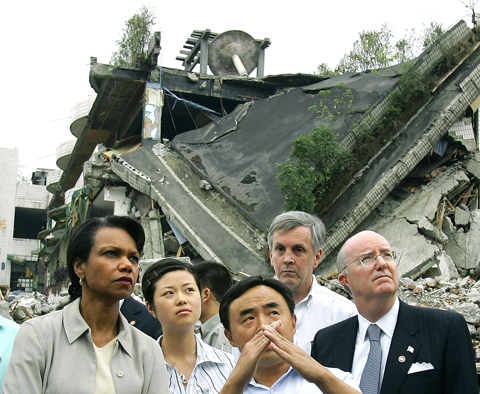US Secretary of State Condoleezza Rice arrived in Beijing yesterday for talks expected to focus on pushing forward six party talks on North Korea’s nuclear program.
Rice arrived in Beijing after touring China’s earthquake shattered Sichuan Province.
Her visit comes after North Korea handed in a key declaration last week outlining its nuclear activities and destroyed the cooling tower of its Yongbyon nuclear power plant.

PHOTO: AP
In Sichuan, Rice met children who were made homeless by last month’s devastating earthquake and praised the country’s response to the disaster.
Rice offered her support to those who survived the quake, which left 88,000 people dead or missing and up to 5 million displaced.
“I’ve been tremendously impressed with the recovery, with the resilience of the people,” Rice told journalists after touring the wrecked city of Dujiangyan, near the epicenter.
Besides touring the city that has suffered up to US$7.1 billion in economic damage, Rice visited victims in a make-shift refugee camp.
When Rice dropped into a classroom, Zhou Yifan, a student living at the camp spoke to her in English, saying: “My pleasure to take a photo with you. I often see you on TV, you are a superstar.”
Rice was expected to hold talks with Chinese President Hu Jintao (胡錦濤) and Prime Minister Wen Jiabao (溫家寶) today.
During her talks with China’s leaders, Rice said she would discuss ways to get China’s close ally Myanmar to accept international aid following a typhoon that slammed the country last month.
“It has been sad that the Burmese authorities, instead of making possible the international community’s response to their people, that they have put up barriers to that response,” Rice said. “Many lives could have been saved, perhaps many more can still be saved if we can get that response.”

TRAGEDY STRIKES TAIPEI: The suspect died after falling off a building after he threw smoke grenades into Taipei Main Station and went on a killing spree in Zhongshan A 27-year-old suspect allegedly threw smoke grenades in Taipei Main Station and then proceeded to Zhongshan MRT Station in a random killing spree that resulted in the death of the suspect and two other civilians, and seven injured, including one in critical condition, as of press time last night. The suspect, identified as a man surnamed Chang Wen (張文), allegedly began the attack at Taipei Main Station, the Taipei Fire Department said, adding that it received a report at 5:24pm that smoke grenades had been thrown in the station. One man in his 50s was rushed to hospital after a cardiac arrest

A car bomb killed a senior Russian general in southern Moscow yesterday morning, the latest high-profile army figure to be blown up in a blast that came just hours after Russian and Ukrainian delegates held separate talks in Miami on a plan to end the war. Kyiv has not commented on the incident, but Russian investigators said they were probing whether the blast was “linked” to “Ukrainian special forces.” The attack was similar to other assassinations of generals and pro-war figures that have either been claimed, or are widely believed to have been orchestrated, by Ukraine. Russian Lieutenant General Fanil Sarvarov, 56, head

SAFETY FIRST: Double the number of police were deployed at the Taipei Marathon, while other cities released plans to bolster public event safety Authorities across Taiwan have stepped up security measures ahead of Christmas and New Year events, following a knife and smoke bomb attack in Taipei on Friday that left four people dead and 11 injured. In a bid to prevent potential copycat incidents, police deployments have been expanded for large gatherings, transport hubs, and other crowded public spaces, according to official statements from police and city authorities. Taipei Mayor Chiang Wan-an (蔣萬安) said the city has “comprehensively raised security readiness” in crowded areas, increased police deployments with armed officers, and intensified patrols during weekends and nighttime hours. For large-scale events, security checkpoints and explosives

PUBLIC SAFETY: The premier said that security would be tightened in transport hubs, while President Lai commended the public for their bravery The government is to deploy more police, including rapid response units, in crowded public areas to ensure a swift response to any threats, President William Lai (賴清德) said yesterday after a knife attack killed three people and injured 11 in Taipei the previous day. Lai made the remarks following a briefing by the National Police Agency on the progress of the investigation, saying that the attack underscored the importance of cooperation in public security between the central and local governments. The attack unfolded in the early evening on Friday around Taipei Main Station’s M7 exit and later near the Taipei MRT’s Zhongshan